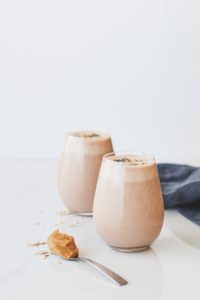When you consider ways to protect your skin in the sun, most of them tend to be external. Wearing high spf (minus harmful toxins), seeking shade during the hottest hours, and covering up with a hat or scarf can all help to combat sun-related skin degeneration. But when it comes to protecting your skin (and preventing premature ageing), mitigating the effects of the sun is an inside job.
Building an internal defense against sun damage
Although external protection is important, paying attention to our body’s own internal defenses against sun damage is also key to prevent premature signs of ageing.
You can build an internal defense against pollutants, toxins and daily sun exposure through upping your intake of certain foods that are rich in antioxidants, such as polyphenols, omega 3 and vitamin C. These neutralize and protect against daily aggressors which could impact upon the health and appearance of your skin. But alongside antioxidants, collagen may also have a role to play in protecting skin against sun damage and premature aging.
 Collagen and sun damage
Collagen and sun damage
Collagen is an essential structural protein which is naturally abundant in the body. It forms the foundations for all our tissues and is a major protein contributing to the healthy growth and maintenance of ligaments, cartilage, bones and blood vessels. Of course, collagen also has a vital role to play in keeping skin, hair and nails well-nourished, strong and beautiful.
Within collagen a chain of amino acids helps to protect and support the regeneration of specific cells within the body. These benefits include reduced appearance of fine lines and wrinkles, improved skin hydration, elasticity and firmness, and faster healing of scars and wounds. This all naturally helps to strength and support skin’s natural integrity whilst protecting against the potentially destructive effects of free radicals and sun exposure.
How to incorporate collagen into your daily routine
Collagen is incredibly versatile – it’s found in many foods, and powdered supplements can easily be incorporated into juices, smoothies and soups.
Good sources of collagen include:
*Fish
*Chicken
*Eggs
*Bone broth
*Supplement powders and capsules (although caution is required here – see below)
If you’re vegan, you’ll need to source non-animal derived collagen which can prove trickier, especially if you’re opting for a supplement. However there are a number of plant-based ingredients that have been shown to help stimulate collagen production within the body, such as soy, white tea and leafy green vegetables. As is the case with collagen, scientific evidence is lacking on exactly how much collagen is synthesized from consuming collagen-rich or collagen stimulating foods, but some options to try include:
*Seaweed broth
*Berries
*Herbs (such as ashwagandha and gotukola)
*Avocado
As with all types of supplements, it’s important to take care and source a high-quality product to ensure maximum benefits and avoid consuming toxic added ingredients.
Take a look at our CollaGlow blend here, containing collagen for beautifully protected skin, hair and nails.






